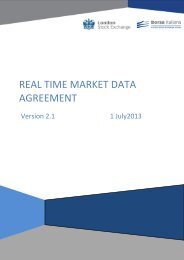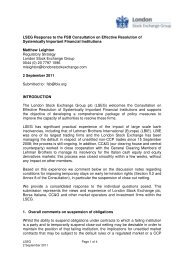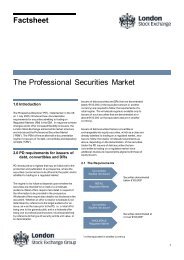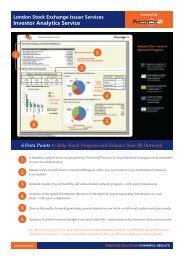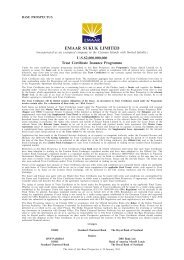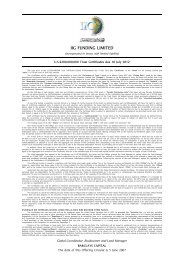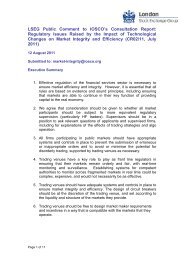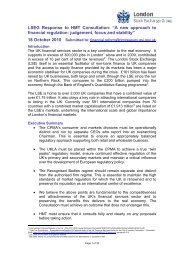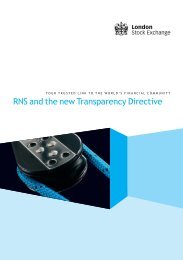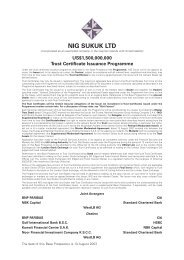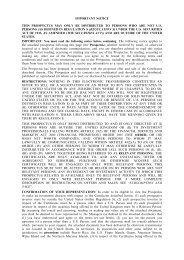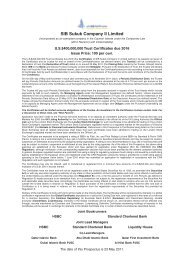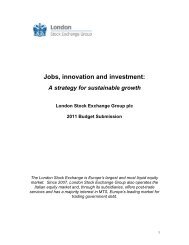Investor Relations - A Practical Guide - Investis
Investor Relations - A Practical Guide - Investis
Investor Relations - A Practical Guide - Investis
Create successful ePaper yourself
Turn your PDF publications into a flip-book with our unique Google optimized e-Paper software.
Annual Reports<br />
Richard Carpenter, Managing Partner, Merchant<br />
Reporting changes<br />
The corporate reporting environment in the UK and<br />
overseas has gone through significant change in<br />
recent years. Annual report content in the UK has<br />
been subject to regulatory and legislative change<br />
that has impacted both the front and back sections<br />
of annual reports – ranging from the once<br />
mandatory Operating and Financial Review (OFR),<br />
through to the Business Review and Enhanced<br />
Business Review and the implementation of<br />
International Financial Reporting Standards (IFRS)<br />
for the accounts.<br />
The technological environment has changed<br />
significantly too. Many companies are looking to<br />
move their reporting into an online format. That<br />
progression has been helped by changing<br />
legislation both in the UK (the Companies Act<br />
2006) and overseas allowing companies to default<br />
to online or electronic communications with their<br />
shareholders – rather than sending printed<br />
material.<br />
Key document<br />
Due to its statutory nature, the production of the<br />
annual report should be seen as a key activity in<br />
any company’s investor relations programme. In<br />
many ways, the annual report is a direct extension<br />
of a one-on-one meeting with investors – it gives<br />
the strategic detail of the results information that is<br />
released at the time of the preliminary<br />
announcement. As with any other key part of the<br />
investor relations programme, the publication date<br />
of the annual report should be set well in advance<br />
as part of a company’s financial calendar.<br />
Content<br />
The annual report remains an absolutely key part<br />
of the overall shareholder and stakeholder<br />
communications mix. Many companies view it as<br />
the document that brings together all of their key<br />
messages throughout the year. It is, in that regard,<br />
a sort of ‘convenience publishing’ tool for<br />
investors. It should bring together a description of<br />
the business; the context in which the business is<br />
operating; an overview of strategy, performance<br />
and operations; plus key governance information,<br />
including risks and uncertainties. Last, but certainly<br />
not least, it should present the main financials,<br />
together with detailed explanatory notes. In essence,<br />
the report should give readers an in-depth<br />
understanding of the company, its performance and,<br />
crucially, its prospects going forward.<br />
This latter aspect of the annual report’s role has<br />
grown in prominence in recent years with<br />
companies paying more attention to the ‘forwardlooking<br />
information’ they include within the<br />
document. As such, there needs to be a clear<br />
balance in giving some indication of future<br />
prospects without making unrealistic statements<br />
that could compromise the directors’ legal<br />
obligations. Companies that are adept at<br />
presenting this type of forward-looking information<br />
tend to concentrate their efforts on talking about<br />
their plans for the future – for example, strategy –<br />
and setting those plans in the context of the<br />
threats and opportunities that they currently see in<br />
their marketplace. It is increasingly common to<br />
also use externally-sourced statistics to back up<br />
that sort of case – for example, overviews from<br />
industry bodies that analyse the sector.<br />
Building the <strong>Investor</strong> <strong>Relations</strong> Programme 57



